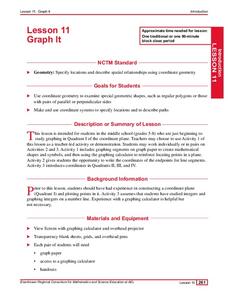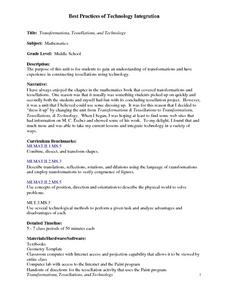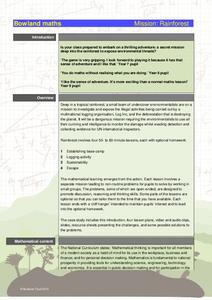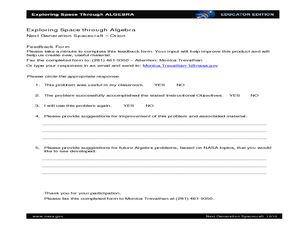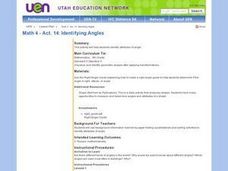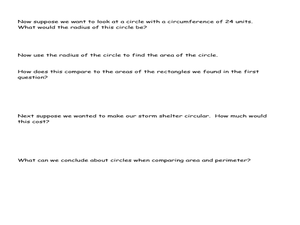Curated OER
Tiling the Plane
Students use pattern blocks and triangular grid paper to review shape names, be introduced to the concept of a tiling of the plane, and determine which pattern blocks tile the plane. They are asked: "Have you ever seen a floor or a wall...
Curated OER
Geometry and Tony Smith Sculpture
Students respond to Tony Smith's sculpture as art and brainstorm about math concepts inherent in his work. They create a sculpture with polyhedra nets, calculate the cost of covering sculpture in gold, and write an exhibit label for...
Curated OER
The Trapping of Trapezoids
This is a nice hands-on activity where young geometers create trapezoids and calculate their area by looking at areas of quadrilaterals and triangles.
Curated OER
Line and Shape Game
Students create a picture of an actual scene or overlap the called out lines or shapes into a space-breaker. If someone calls out a line or shape a student had not planned to use in the art, they have to figure out some way to use it...
Curated OER
Geometry on a Grand Scalle
Students, in groups, construct different angles and shapes on a large scale using string and chalk.
Curated OER
2-D Polygons
Students investigate the concept of two dimensional polygons. They complete a vocabulary chart with the teacher or in independently. Students are shown various polygons in order to classify them and then asked to draw one of them from...
Curriculum Corner
Earth Day Grid Math
Get into springtime with a festive practice sheet designed to test scholars' knowledge of grids. Learners locate items such as watering cans, snails, and flowers following the x and y-axis. Worksheet themes include Earth Day, gardening,...
Curated OER
Discovering Conic Sections in the Motion of Heavenly Bodies
Math scholars study conics and how they are used today. In this mathematical lesson, pupils construct and slice cones after viewing a demonstration.
Curated OER
Symmetrical Snowflakes
First graders, exploring lines of symmetry, follow directions to create a symmetrical snowflake from their own homemade icing. As a class, they discuss lines of symmetry and determine if specific shapes are symmetrical. After the lesson,...
Curated OER
Graph It
Elementary and middle schoolers engage in a lesson of graphing in quadrant I of the coordinate plain. They use the graph to create shapes and symbols. While using a graphing calculator, they locate the points on the coordinate plane. In...
Curated OER
Slides, Flips. Turns......It's All On A Memory Book Page
Fourth graders use tangram sets to investigate the congruence of shapes. They use congruent shapes to demonstrate the properties of slides, flips, and turns. They complete a math journal entry that describes and illustrates each concept.
Curated OER
Talking About Your Name in Math Terms
Add imagination and creativity to your math lesson. Young mathematicians investigate ways to express their names in mathematical terms. For instance, they can count the number of letters, analyze the geometric shapes of the letters, or...
Curated OER
Moving Day!
Eighth graders continue their geometry unit by focusing on volume. Using data, they create a spreadsheet, estimate and calculate volume. They solve real-life problems and round their answers to the hundredths place. They also practice...
World Wildlife Fund
Take 6
Investigate the various properties of the number six with this elementary math lesson. From simple addition, subtraction, multiplication, and division problems to the creation of hexagonal tessellations, this lesson covers all aspects of...
Curated OER
All A-buzz About Math
Second graders participate in Math-Eze activities to comprehend word problems. In this word problem lesson, 2nd graders recognize why a hexagon is the best shape for a beehive. Students calculate how far bees must travel to find 2 lbs....
Curated OER
Transformations, Tessellations, and Technology
Students complete a unit about transformations and tessellations. They explore various tessellation websites, determine which shapes tessellate, complete a log about which website activities they complete, and create a tessellation...
Curated OER
Symmetry in My World
Second graders demonstrate understanding of symmetry and identify objects that have symmetry. They use a mirror to get a visual illustration of what symmetry is. They create a collage of symmetrical pictures they find in magazines.
Bowland
Mission: Rainforest
Young environmentally conscious mathematicians solve a variety of problems related to the central theme of uncovering illegal logging activities. They determine a base camp based on given constraints, investigate logging activities and...
NASA
Next Generation Spacecraft - Orion
Emergine space engineers discover the area of complex geometric shapes. They find that, just as a spacecraft is composed of many smaller parts, so can polygons be broken into smaller shapes.
Curated OER
Identifying Angles
Fourth graders discuss and examine examples of the different types of angles. After learning the names of the geometric shapes students identify the types of angles and then complete the Kidspiration activity, Identifying Angles.
Curated OER
Mr. Bo Jangle, What's Your Angle?
Third graders explore angles. In this geometry lesson, 3rd graders identify and define acute, obtuse, and right angles. Students form angles with their bodies, find angles in picture books, and record angles found outside in their math...
Curated OER
Polydron Fun
Students investigate nets as they relate to volume and area. In this geometry lesson, students use nets as a visual to deepen their understanding of surface area and volume of objects. They make conjectures about different objects and...
Curated OER
Scenario Challenge
Students create a quilt, using different patterns. In this geometry lesson, students apply prior knowledge as they use different patterns to help them create a quilt using transformations and geometric shapes.
Curated OER
Comparing Area and Perimeter
Students solve problems by finding the perimeter and area of an enclosed area. In this geometry lesson, students differentiate between the area and the perimeter. They see how they relate and how to use it to maximize an enclosed area.











